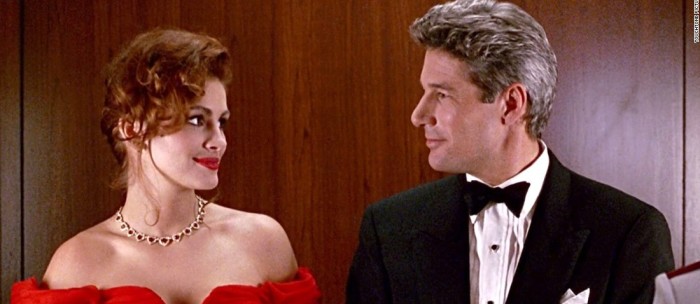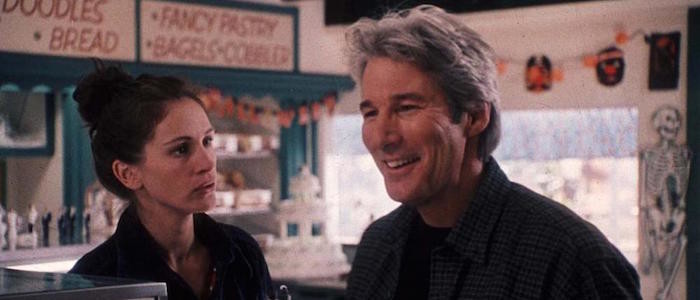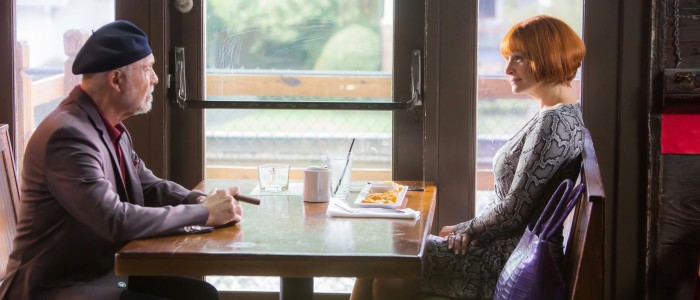One Year After His Death, Garry Marshall's Work Looms Larger Than Ever
(Welcome to What Women Watch, a series exploring what modern women are watching, and loving, on the big and small screens. In this edition, we examine the work of the late Garry Marshall and the fingerprints he's forever left on the romantic comedy.)"I don't like to call them chick flicks."It has been one year since we lost Garry Marshall and the world has felt a little darker for it. Marshall is one of those filmmakers that has felt more like a comforting friend – Pretty Woman was my late grandmother's favorite movie and I have probably seen it more times than Cinderella. It's still my favorite fairytale. When my husband leaves (and since he's in the military, that is quite often), it is the first movie I watch. During the stressful times when he is gone, I also find myself watching Marshall's other films, like Runaway Bride or Valentine's Day, not because they are masterpieces of American cinema, but because, while the other half of the bed is cold, those movies keep me warm.
That may sound hokey, but I mean that with all sincerity. While the world is ready to cringe at anything that feels too...well anything just feels, Garry Marshall offered sincerity in spades. He never shied away from it, his films were heartwarming for the sake of being heartwarming and for that I am forever thankful.
Although that concept might not appeal to everyone, and some of it might even seem dated, it is important to remember that without Marshall, the modern romantic comedy would not exist. With Pretty Woman, Garry Marshall cemented a formula that became a fountainhead for a genre that has flourished over nearly 30 years. It has evolved and taken new forms, but the foundations are the same, most notably in the form of Judd Apatow and the age of the R-rated romcom. Though something as tame as Pretty Woman seems a far cry from something like Knocked Up or Trainwreck, these films are cousins. Marshall offered a blend of dramatic conflict, romance and humor, but he also showcased respect for every relationship in a story, whether it be the romance at the core or the family and friends by their side.
 "I try to find scripts of stories that kinda celebrate the human condition...let's talk about the tough world out there and the human spirit overcoming adversity."Boy meets girl. Boy and girl fall in love. Boy screws it up. Boy and girl reconcile. Happily ever after. The central theme to any romantic comedy. However, part of the beauty of love is its ability to conquer over the most dreadful of conditions and tragedies. It is the key to humanity. When you take something like a love story and you lay it under shallow conflict, you ignore the very constitution of love. Garry Marshall never wasted time on petty conflicts. Going back further than Pretty Woman, Beaches explored the idea of soul mates through friends, tackling everything from jealousy to mortality. If love is supposed to conquer all, then the stories that revolve around it should do it justice.Pretty Woman deals with a number of ideas that seem gritty on the surface. People refer to Vivian as the "hooker with a heart of gold," but I don't see her as an exception. It is not a stretch to believe that many women in her situation can possess a heart of gold. Unfortunately, too many people just don't view sex workers as people. A modern retelling of Cinderella, Pretty Woman dives heavily into classicism. Not just the surface level variety, as represented in the iconic Rodeo Drive sequence, but the twisted kind that leads to Vivian being sexually assaulted while Stuckey calls her a "fifty dollar whore." At this point, she has the expensive clothes, she has gained the admiration and respect of the upper class from Edward to Mr. Morse, and she has learned to respect and love herself...and yet a rich and powerful man like Stuckey still sees her as less than human. The sad part is that the scene doesn't even feel forced or over-the0top. It feels sincere for a man like Stuckey. Pretty Woman is a heartwarming love story with the scope to take on the darker side of man.
"I try to find scripts of stories that kinda celebrate the human condition...let's talk about the tough world out there and the human spirit overcoming adversity."Boy meets girl. Boy and girl fall in love. Boy screws it up. Boy and girl reconcile. Happily ever after. The central theme to any romantic comedy. However, part of the beauty of love is its ability to conquer over the most dreadful of conditions and tragedies. It is the key to humanity. When you take something like a love story and you lay it under shallow conflict, you ignore the very constitution of love. Garry Marshall never wasted time on petty conflicts. Going back further than Pretty Woman, Beaches explored the idea of soul mates through friends, tackling everything from jealousy to mortality. If love is supposed to conquer all, then the stories that revolve around it should do it justice.Pretty Woman deals with a number of ideas that seem gritty on the surface. People refer to Vivian as the "hooker with a heart of gold," but I don't see her as an exception. It is not a stretch to believe that many women in her situation can possess a heart of gold. Unfortunately, too many people just don't view sex workers as people. A modern retelling of Cinderella, Pretty Woman dives heavily into classicism. Not just the surface level variety, as represented in the iconic Rodeo Drive sequence, but the twisted kind that leads to Vivian being sexually assaulted while Stuckey calls her a "fifty dollar whore." At this point, she has the expensive clothes, she has gained the admiration and respect of the upper class from Edward to Mr. Morse, and she has learned to respect and love herself...and yet a rich and powerful man like Stuckey still sees her as less than human. The sad part is that the scene doesn't even feel forced or over-the0top. It feels sincere for a man like Stuckey. Pretty Woman is a heartwarming love story with the scope to take on the darker side of man.
In Garry Marshall's later films, he addresses a wide variety of situations of the "human spirit overcoming adversity." In Valentine's Day, New Year's Eve, and Mother's Day, Marshall juggles all forms and fashions of love and the struggles that go along with them. New Year's Eve has a seven percent rating on Rotten Tomatoes, and yet the scene where the hardworking nurse, played by Halle Berry, dresses up just to Skype with her deployed husband for five minutes to tell him, "Happy new year" (while the city outside of the hospital walls is hosting the biggest NYE party in the world) is one of the most honest and sincere portrayals of what that situation actually feels like that I have seen. There is nothing petty about that.
Judd Apatow strongly follows Garry Marshall's model of never handling anything too lightly. His movies are thick ideas dodged by movies with less nerve. From unplanned pregnancy to depression, Apatow's stories and characters are never simple. He handles, with honesty and heart, what a marriage can look like after years of forcing a connection that isn't always there. In a strange way, there is even a connection between Seth Rogen's character, Ben, in Knocked Up and Vivian in Pretty Woman, as two people who just can't seem to see their own potential in a world that treats them like trash. When love ultimately triumphs in these stories, it feels big and bold and all-consuming. It signifies not only the triumph of love between people, but a triumph of self-love that each character needs in order to overcome the obstacles to accepting themselves.
 "As difficult as it is to part with lovers, to part with a great friendship is just as hard."
"As difficult as it is to part with lovers, to part with a great friendship is just as hard."
In Garry Marshall's commentary on Pretty Woman, he discusses how he was asked to cut the scene at the end where Vivian, fresh off deciding that she deserved the fairy tale, goes to Kit for an emotional goodbye. In this scene, Vivian gives Kit money, a point of conflict for the two friends early on in the film, and then tells Kit that she has potential. As expressed earlier, "the bad stuff is easier to believe." Vivian may have had her epiphany, but out of love for the girl that, for better or worse, took her under her wing, she wants to push Kit in the direction of her own happy ending. Why would he be asked to cut such an important and emotional scene? Because it wastes time that could be spent focusing on Vivian and Edward. Obviously, and thankfully, Garry Marshall told them no, and the scene remains.
Love always triumphs, but love isn't always romantic. Garry Marshall always put soul into every relationship within the film and he had a deep understanding of human connection. No relationship is secondary, but instead, they;re part of what makes a person, a person. Each one feeds or poisons the other. In Garry Marshall's 1999 film Runaway Bride (which reunited Julia Roberts and Richard Gere), Maggie's strained relationship with her alcoholic father is a source for her not knowing herself and feeling stuck within the confines of her small town. Every relationship changes a person, and therefore every relationship deserves a certain amount of weight. Instead of making these secondary characters mere sounding boards for lovers' quarrels, Marshall treats every single one with respect to the other. In Pretty Woman, it is Edward's soured relationship with his late father that makes him into the kind of emotionally detached business man that would rather pay a professional than deal with any romantic attachments, leading to him meeting Vivian. But it is Edward's relationship with Vivian that softens him to the idea of opening his heart, which in turns leads him to terminate his relationship with Stuckey and find a father figure with the charming Mr. Morse.
Nobody has understood and taken this concept to heart more than Judd Apatow. In all of Apatow's films, there is not only a since of romance and sincerity, but every film is a web of connections. All of the relationships are vivid. In Trainwreck, Amy's relationship with her sister and her father are not only as important as her relationship with Aaron (Bill Hader), but they are important to her relationship with Aaron. Much like Edward in Pretty Woman, all of Amy's relationships are deeply intertwined – something can't happen in one without changing the others. In, Knocked Up, a similar attention to detail can be seen in the many relationships with that film. There is less interconnection than there is in Trainwreck, but the juxtaposition between the primary relationships in Allison's life and the primary relationships in Ben's life is important to expand and explain the conflicts in the romance between the two leads. Buddy movies, family dramas, and romances all make great films on their own, but they are much riper when the connections between them are explored.
 "I made nepotism an art form."We have grown to love "easter eggs" in everything from Pixar to superhero movies to Star Wars. A quick little flash of something familiar, something tongue-in-cheek for the fans, something comforting that brings a quick and easy smile to your face. Garry Marshall was a master at this. The waiter that caught the snail in Pretty Woman and declared that it, "happens all the time" went on to appear in several more of Marshall's film, always with the same line.
"I made nepotism an art form."We have grown to love "easter eggs" in everything from Pixar to superhero movies to Star Wars. A quick little flash of something familiar, something tongue-in-cheek for the fans, something comforting that brings a quick and easy smile to your face. Garry Marshall was a master at this. The waiter that caught the snail in Pretty Woman and declared that it, "happens all the time" went on to appear in several more of Marshall's film, always with the same line.
Hector Elizondo appeared in every one of Marshall's films from Beaches all the way to Mother's Day, always offering a comforting word. After playing the store manager very gifted at "major sucking up" in Pretty Woman, Larry Miller also became a fixture in the "Garry Marshall universe," playing everything from a stylist to a bartender to a tow truck driver. Even Patrick Richwood was part of the Marshall film family. And beyond the on-set family, Marshall also always included his own family. Both his son Scott and his daughter Kathleen were involved in almost all of his films. In a genre built around human connection, these two masters not only create those connections on screen between characters, but they create them between the audience and the picture in front of them. Hector Elizondo, Larry Miller, Kathleen Marshall, and even cameos of Garry Marshall himself begin to feel like old friends that you know are coming and can't wait to see.
It has the strange effect of making you love Marshall for how much his clearly loves his family and friends. It makes you think that there was joy on set while these films were in production. It makes you feel like these movies are not only about love, but that they came from love. They create comfort, and a since of honesty in the actual human connections between these people.
It brings a little tear to my eye that Marshall's final film, Mother's Day, brought Hector Elizondo and Julia Roberts together again for one such "easter egg." Though the two also shared the screen in Runaway Bride and Valentine's Day together, they did not get to share a tender moment on the level of their first appearance in a Marshall film. Towards the end of Mother's Day, as Roberts' character is in desperate need of some comforting advice, Elizondo is there to oblige. During this sincere moment between these two characters, they manage to squeeze in a reference about which fork to use as Julia's character eats some fried green tomatoes. The moment brought a big to smile to mine and my mother's faces as we sat in the theater enjoying the movie together, just like we had for many Garry Marshall films in the past.
We could not have known at the time that, only a few months later ,the world would lose Garry Marshall, and with him a little bit of sincerity.
